
Have you thought about sustainable bedding?
Sustainable bedding is probably not the first thing that comes to mind when you think about moving toward more eco-minded behaviour.
However, when you think about it, pretty much everyone has multiple sets and washes them regularly.
Have you ever checked what your sheets are made from or their impact?
This week we look at exactly that and give you straightforward facts so that you can continue on your sustainable journey.
With that in mind, here is this week’s weekly tip which hopefully, will empower you to make more informed decisions (and save some money).
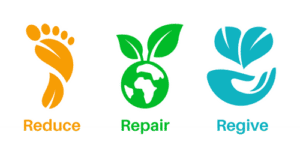
When bedding was sustainable
The history of bedding dates back to ancient civilizations, where woven textiles were used as coverings for sleeping surfaces.
Early neolithic (stone age) bedding was made from natural fibres such as cotton, linen, and wool.
It was the Egyptians who 3,000 years ago discovered that sleeping on a surface raised off the ground is much more comfortable.
As civilizations developed, so did the techniques for producing bedding, leading to softer and more durable materials.
In the Middle Ages, bedding was a symbol of wealth and status.
Only the wealthy could afford to have multiple sets of bedding, which were often embroidered with intricate designs.
During the Industrial Revolution, mass production techniques led to a decrease in cost and an increase in the availability of bedding.
Today, bedding is made from a variety of colours, shapes, sizes and materials including cotton, linen, silk, and synthetic fibres.

Mass-produced bedding shipped across the world like any other product has an environmental impact and next we discuss that.
Why is some modern bedding not sustainable?
The environmental impact of bed linen production is significant.
A major issue is that the cultivation of cotton, a common material used in bed linen, requires large amounts of water and pesticides.
In fact, on average, it takes about 10,000 litres of water to produce 1 kg of cotton.
Synthetic fibres, such as polyester, which much modern bedding is made from, are made from fossil fuels and do not biodegrade.
On top of this, Studies have found that on average, a single synthetic garment can release more than 1,900 fibres each time it is washed.
These fibres end up in our rivers and oceans and ultimately in the food chain.
Another issue is that the dyes used in bed linen production can also have negative environmental effects.
Environmental effects can include the use of harmful chemicals and pollution of water sources from dye runoff.
Next to consider is the factory production and transportation of bed linen which also contribute to carbon emissions.
Finally, the disposal of bed linen poses a problem.
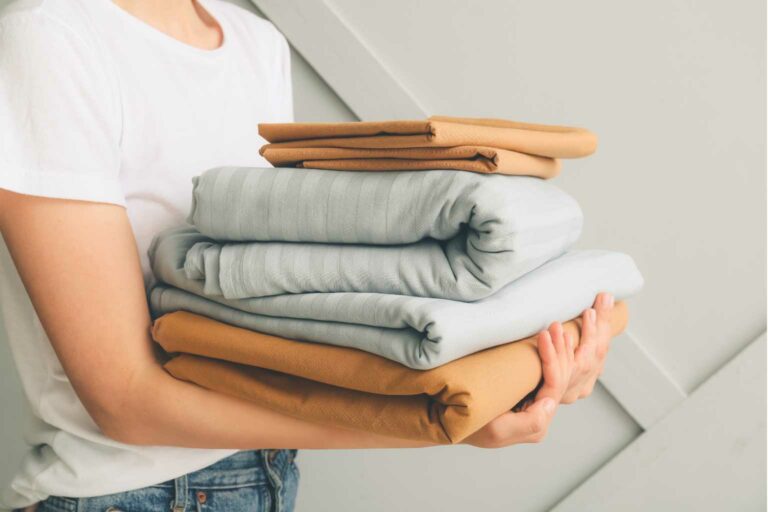
A recent survey by organic bedding company Coyuchi found that in the US alone, 10 million tons of bed linen are thrown away every year!
This is a problem when even traditional cotton sheets can take up to 80 years to decompose in a landfill.
Considerations for sustainable bedding
Whilst the numbers above can be quite mind-blowing, you can make your bedding sustainable by following a few simple steps.
First, choose bed linens made from natural materials such as organic cotton, linen or bamboo.
These materials are grown without the use of harmful pesticides and are recyclable and biodegradable, making them a more sustainable option.
Additionally, look for bed linens that have been certified as organic by reputable organizations.
Next, consider the dye used to colour the bed linens.
Opt for natural dyes, which are less harmful to the environment and human health.
Avoid bed linens that have been treated with chemical finishes, such as wrinkle-free or stain-resistant treatments, as these can also have negative effects on the environment.
When it comes to caring for your sustainable bedding, opt for natural laundry detergents and avoid using fabric softeners or bleach.
These chemicals can harm the environment and can also damage the natural fibres of your bed linens.
You should also wash at 30 degrees or less if possible to reduce energy use.
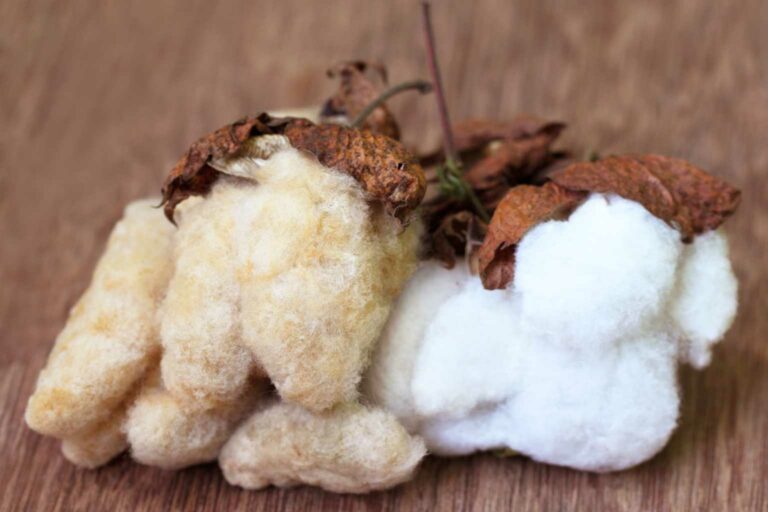
Finally, consider the longevity of your bed linens.
Invest in high-quality sustainable bedding that will last for years to come, rather than buying cheaper options that will need to be replaced frequently.
By following these simple steps, you can make your bed linen sustainable, help protect the environment and reduce your footprint.
Some sustainable bedding brands we love
Ecosophy
The first brand we love is Ecosophy.
Ecosophy is a Greek word that combines the words eco (household) and sophy (wisdom) to encourage people to be wise when making ecological purchases.
Because the emphasis of this brand is on nature, natural fibres such as organic cotton and organic linen are used.
Their GOTS-certified 100% organic linen bedding is made from organically grown flax in France.
Check out their white organic bed linen which is designed to have a slightly crumpled look to save you from needing to iron it!
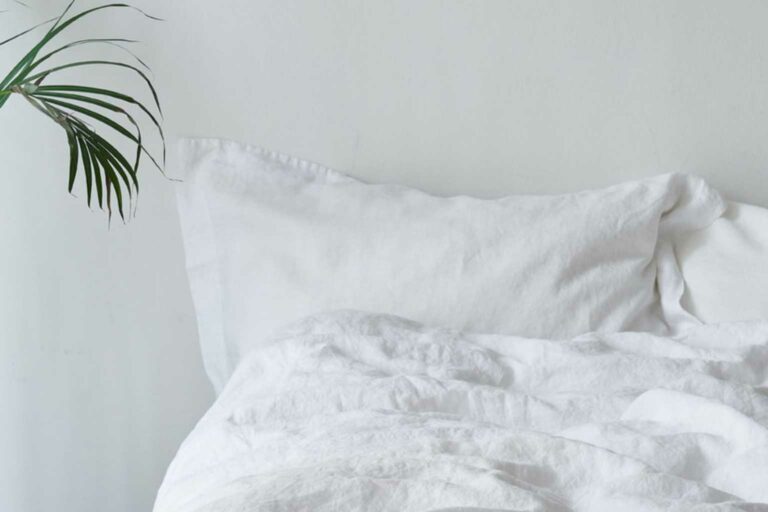
TOAST
The next sustainable bedding brand we love is TOAST.
TOAST collaborates with fair trade co-ops all over the world to support artisans and traditional crafts.
These crafts include block printing, embroidery, tie-dye, and hand weaving.
All of its suppliers adhere to the TOAST Code of Conduct, which stipulates either a national living wage or an industry benchmark standard, whichever is higher.
Over 85% of the materials used are natural, including organic cotton, making it the cosiest bedding in the winter and the coolest in the summer.
Toast’s organic cotton Pyjama Stripe bedding is lovely looking and super sustainable
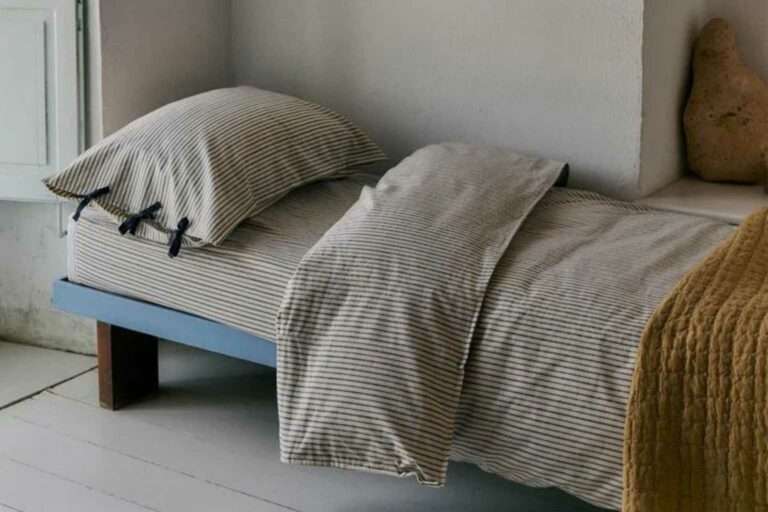
Lily & Mortimer
The final sustainable bedding brand we love is Lily & Mortimer.
Lily & Mortimer’s organic bedding collection is simple but stylish.
This company sells organic, fairtrade bedding, including duvets, pillows, and bed sheets.
Their cotton comes directly from the Chetna Organic and Fairtrade Intervention programme.
The programme aims to improve the socioeconomic status of smallholder farmers as well as their skills.
They have a range of great bedding and we particularly liked their Star Gazer Duvet and Pillow set.
Best of all if you sign up for their mailing list now, you can claim 10% off your first order!

That’s it for this week.
A look at the history, environmental impact and ways and products that help you to be more sustainable.
Hopefully, you have learned something new and feel empowered to take the next step on your personal journey to a more sustainable future.
Play It Green is a subscription service that helps people and businesses.
Through our 3-step solution, we support footprint reduction, repairing the planet (through reforestation) and increasing social impact by regiving 10% of turnover to charity.
For £5 per person per month, we send out a weekly newsletter with our weekly tip, sustainable discounts, news and education.
Following this, we plant thirteen trees each month with our partner Eden Reforestation in Madagascar and then give 10% of the subscription to a charity of your choice.
That’s a lot of positive impact and value for less than a coffee and a piece of cake!
You can use the button below to sign up!






